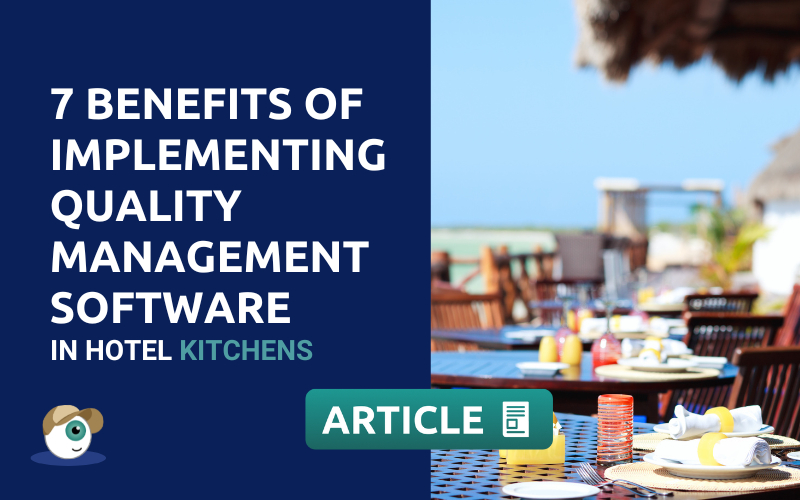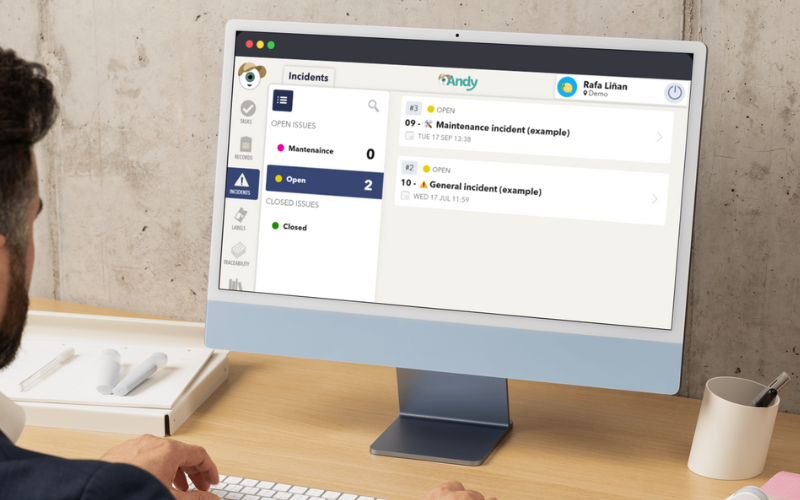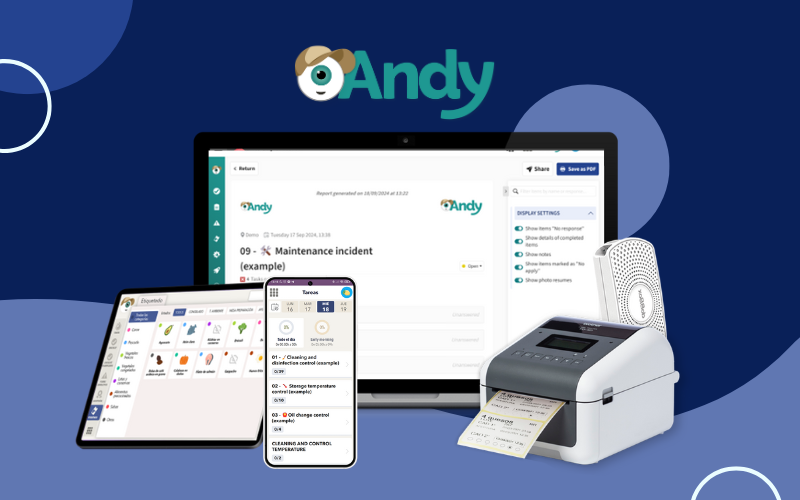7 Benefits of Implementing Quality Management Software in Hotel Kitchens
Did you know that 56% of guests consider food quality a key factor when choosing a hotel?
Gastronomy has evolved from being a simple add-on to becoming an essential pillar of the hotel experience.
Today’s guests are not just looking for a place to sleep: they are looking for a holistic experience, with dining offers that stand out for their originality, authenticity, and, above all, their quality.
A hotel kitchen today must not only surprise the palate but also be responsible for ensuring food safety, creating an unforgettable experience for each guest.
Not to mention, foodborne illness outbreaks can cause irreparable damage to a hotel’s reputation!
In this new hotel landscape, having quality management, food safety, and operational software is crucial as it helps kitchen teams maintain the high standards that customers expect.
Discover the many benefits of implementing quality management software in your hotel’s kitchen in this post.
7 Benefits of Implementing Quality Management Software in Hotel Kitchens
1/ Quality Management Software Improves the Quality and Consistency of Dishes
Quality management software allows you to set and maintain high standards for every dish that leaves the kitchen.
This is achieved through the following features:
- Digitised and Standardised Recipes:
- Recipe Database: The software stores all recipes digitally, including ingredients, exact quantities, and step-by-step instructions.
- Reference Images: Photos of each dish can be attached to ensure that presentation is always consistent.
- Customisation: Recipes can be easily adapted to create vegetarian, vegan, or allergy-friendly options.
- Portion Control and Presentation:
- Visual Portion Guides: The software can display images or diagrams to illustrate the correct portion size.
- Presentation Checklists: Checklists can be created to ensure each dish is presented perfectly, with the right sides and decoration.
- Reducing Variability:
- Standard Operating Procedures (SOPs): The software allows for the creation of detailed SOPs for every task, from ingredient preparation to plating and serving.
- Staff Training: Employees can access SOPs at any time through the software, making training easier and ensuring everyone follows the same procedures.
- Quality Tracking:
- Regular Evaluations: Dish quality can be assessed periodically to identify areas for improvement and adjust recipes or procedures.
- Customer Feedback: Customer reviews can be collected and analysed to continuously improve dish quality.
Additional Benefits of Recipe Standardisation:
- Reduced Food Waste: By knowing the exact quantities of ingredients needed, overproduction is avoided, and resources are optimised.
- Improved Efficiency: Chefs can prepare dishes faster and more accurately, reducing wait times.
- Higher Customer Satisfaction: Customers appreciate the consistency of dishes and the assurance that they will always receive what they expect.
2/ Quality Management Software Increases Operational Efficiency
Quality management software allows you to optimise processes and reduce costs, freeing up time for staff to focus on more creative and value-added tasks.
Some of the standout benefits include:
- Optimising Menu Planning and Inventory Management:
- Demand-Based Menu Planning: The software can analyse historical sales data to predict demand for different dishes and adjust menus accordingly, reducing food waste.
- Real-Time Inventory Management: The system helps track inventory levels precisely, preventing stockouts and overproduction.
- Supplier Management: Relationships with suppliers can be managed more efficiently, negotiating better prices and ensuring on-time delivery of products.
- Automation of Repetitive Tasks:
- Automatic Order Generation: The system can automatically generate orders to suppliers based on inventory levels and kitchen needs.
- Task Scheduling: Tasks such as defrosting food, cleaning equipment, and preventive maintenance can be scheduled to ensure they’re carried out efficiently and on time.
- Reduction of Dish Preparation Time:
- Optimised Workstations: Quality management software helps organise workstations more efficiently, reducing unnecessary movement of staff.
- Pre-preparation of Ingredients: Some ingredients can be prepared in advance to speed up service during peak hours.
- Improved Communication:
- Real-Time Communication: The software enables all kitchen staff to communicate in real-time, improving coordination and efficiency.
Additional Benefits of Increased Operational Efficiency:
- Cost Reduction: By optimizing inventory management and reducing food waste, significant savings in operational costs can be achieved.
- Improved Productivity: Kitchen staff can focus more on value-added tasks, such as creating new dishes or training new employees.
- Higher Staff Satisfaction: By simplifying tasks and reducing stress, staff satisfaction is improved, which helps reduce turnover.
3/ Ensuring Food Safety with Quality Management Software for Hotels
Quality management software is an essential tool for ensuring food safety in hotel kitchens. By automating processes and centralising information, quality management software helps prevent foodborne illnesses and comply with health regulations.
- Cooking and Storage Temperature Control, and HACCP Management:
- Digital Thermometers: The software can integrate with digital thermometers to record and monitor food temperatures in real-time.
- Automatic Alerts: Alerts can be configured to notify staff when temperatures are outside safe ranges.
- Temperature Graphs: The software can generate graphs that show the evolution of food temperature over time, making it easier to analyse and detect potential issues.
- Tracking Product Shelf Life:
- Expiration Dates: The software can record expiration dates for all products and generate alerts when a product is nearing its expiry date.
- Inventory Rotation: A FIFO (first-in, first-out) rotation system can be implemented to ensure older products are used first.
- Effective Allergen Management:
- Allergen Database: The software stores detailed information about allergens in each ingredient.
- Allergen Labels: Custom allergen labels can be generated for each dish.
- Cross-Contamination Prevention Procedures: The software helps establish procedures to prevent cross-contamination between allergen-containing foods.
- Compliance with Health Regulations:
- Checklists: Checklists can be created to ensure compliance with health regulations in all areas of the kitchen.
- Electronic Documentation: All food safety-related documentation can be securely stored and accessed within the software.
Additional Benefits of Ensuring Food Safety:
- Protecting Customer Health: By preventing foodborne illnesses, customer health is protected, and the hotel’s reputation is safeguarded.
- Legal Compliance: The software helps meet current health regulations, avoiding fines and penalties.
- Increased Customer Trust: Customers will feel safer knowing the hotel takes food safety seriously.
4/ Significant Cost Reduction
Quality management software leads to substantial savings in various areas of hotel kitchen operations:
- Optimising Inventory Management:
- Waste Reduction: By keeping precise control over inventory levels and expiration dates, food waste is minimised.
- More Efficient Purchasing: Orders can be placed more accurately and timely, avoiding over-purchasing or stock shortages.
- Negotiating Better Prices: With larger purchasing volumes and stable relationships with suppliers, better prices can be secured.
- Portion Control:
- Reduced Food Costs: By controlling portions precisely, over-portioning is avoided, and food costs are reduced.
- Preventive Maintenance:
- Prolonging Equipment Lifespan: Scheduling preventive maintenance helps extend the life of equipment and reduces costly repairs.
- Labour Reduction:
- Task Automation: By automating repetitive tasks, staff can focus on higher-value activities.
Additional Benefits of Cost Reduction:
- Higher Profitability: Reducing costs increases business profitability.
- Improved Efficiency: Optimizing processes leads to greater operational efficiency.
- Greater Sustainability: Reducing food waste contributes to the sustainability of the business.
5/ Enhanced Communication and Coordination with Quality Management Software
Quality management software streamlines communication and coordination among kitchen team members, significantly improving service quality and efficiency.
- Facilitating Communication Between Kitchen and Service:
- Digitised Service Orders: Digitising service orders reduces the risk of errors and accelerates the flow of information between the kitchen and service staff.
- Instant Messaging: The software can include instant messaging tools that enable real-time communication between cooks and waitstaff, efficiently resolving questions or issues.
- Control Panels: Real-time dashboards display the status of orders, allowing waitstaff to provide customers with accurate estimated wait times.
- Optimising Order Management:
- Order Prioritisation: The software can help prioritise orders based on urgency or other criteria, ensuring dishes are prepared and served in the correct order.
- Task Assignment: Specific tasks can be assigned to each team member, improving organisation and accountability.
- Order Tracking: The software allows for tracking each order’s progress from receipt to service, making it easier to identify bottlenecks.
- Improving Process Visibility in Real-Time:
- Custom Dashboards: Personalised dashboards can be created to monitor various aspects of operations, such as inventory, production, and sales.
- Detailed Reports: The software generates comprehensive reports on kitchen performance, enabling managers to identify areas for improvement and make data-driven decisions.
Additional Benefits of Improved Communication and Coordination:
- Error Reduction: Enhanced communication and coordination reduce errors in dish preparation and service.
- Increased Customer Satisfaction: Customers benefit from faster, more efficient service, which boosts satisfaction.
- Better Work Environment: Clear communication and improved coordination contribute to a more positive and collaborative workplace atmosphere.
6/ Simplifying Audits and Ensuring Compliance
Quality management software is an invaluable tool for ensuring compliance with health regulations and streamlining the audit process.
- Detailed Record-Keeping:
- Traceability: The software tracks the history of every ingredient and dish, simplifying the identification of any issues’ origins.
- Electronic Documentation: Key documents for audits, such as temperature logs, Standard Operating Procedures (SOPs), and training records, are securely stored and easily accessible within the system.
- Task Automation:
- Checklists: Automatically generated audit checklists ensure that all critical points are covered.
- Custom Reports: Tailored reports demonstrate compliance with regulatory requirements, saving time and effort.
- Non-Compliance Alerts:
- Automatic Notifications: The system flags deviations from established standards, enabling timely corrective actions.
Additional Benefits:
- Increased Trust: Demonstrating commitment to quality and food safety enhances customer confidence and facilitates smoother health inspections.
- Reduced Risk of Penalties: Ensuring compliance helps avoid costly fines or sanctions.
7/ Centralisation and Standardisation
Quality management software centralises all critical kitchen data on a single platform, streamlining management and decision-making.
- Centralised Database:
- Real-Time Access: Team members can access up-to-date information on recipes, ingredients, allergens, and SOPs anytime.
- Eliminating Redundancy: Duplicate data entry is avoided, ensuring information accuracy and consistency.
- Standardising Processes:
- Standard Operating Procedures (SOPs): The software facilitates the creation and distribution of SOPs, ensuring consistent adherence across the team.
- Unified Documentation Formats: Standardised formats for records make organising and retrieving information much simpler.
Additional Benefits:
- Improved Efficiency: Centralised information and standardised processes enhance operational efficiency.
- Streamlined Training: Having all necessary resources in one place simplifies onboarding and training for new employees.
- Enhanced Quality Control: Process standardisation ensures consistent quality in every dish.
Andy: The Digital Assistant Redefining Food Service Quality
Designed to optimise every aspect of your operation, Andy offers a comprehensive and tailored operations, food safety and quality management solution for the unique needs of hotel kitchens:
- Smart Inventory Management: Andy ensures precise tracking of ingredients, reducing waste and optimising purchasing.
- Guaranteed Quality Control: Monitor temperatures, track product shelf life, and ensure compliance with health regulations effortlessly.
- Efficient Communication: Streamline communication between kitchen and service staff, minimising errors and boosting coordination.
- Process Optimisation: Automate repetitive tasks, prioritise orders, and gain real-time insights for smarter decision-making.
- Regulatory Compliance: Andy helps you meet all health standards, simplifying audits and minimising risks.
- Process Standardisation: Establish clear Standard Operating Procedures (SOPs) to ensure consistent quality across dishes.
- Cost Reduction: Optimise ingredient usage, reduce food waste, and negotiate better deals with suppliers.
- Enhanced Customer Satisfaction: Deliver consistent quality and efficiency, delighting your customers every time.
Take your hotel’ kitchen operations to the next level, reduce costs, improve dish quality, and ensure customer satisfaction – with Andy!




